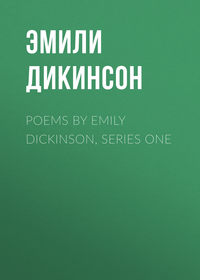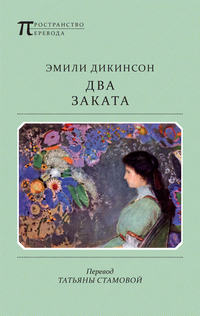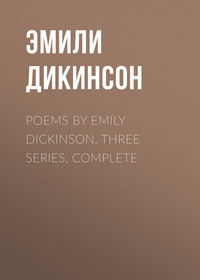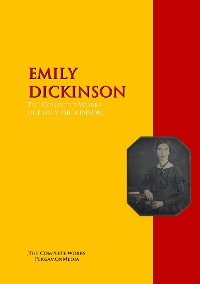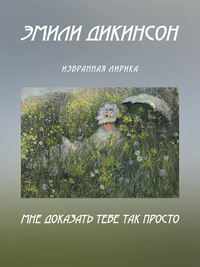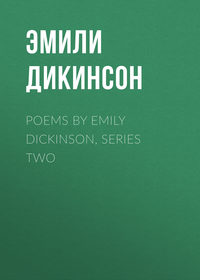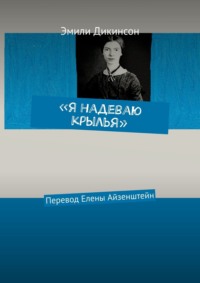Poems by Emily Dickinson, Third Series
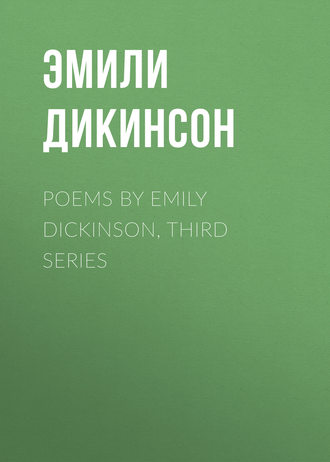 полная версия
полная версияPoems by Emily Dickinson, Third Series
Жанр: зарубежная поэзиязарубежная классиказарубежная старинная литературастихи и поэзиялитература 19 векасерьезное чтениеcтихи, поэзия
Язык: Английский
Год издания: 2018
Добавлена:
Настройки чтения
Размер шрифта
Высота строк
Поля
DREAMS
Let me not mar that perfect dream By an auroral stain,But so adjust my daily night That it will come again.XX.
NUMEN LUMEN
I live with him, I see his face; I go no more awayFor visitor, or sundown; Death's single privacy,The only one forestalling mine, And that by right that hePresents a claim invisible, No wedlock granted me.I live with him, I hear his voice, I stand alive to-dayTo witness to the certainty Of immortalityTaught me by Time, – the lower way, Conviction every day, —That life like this is endless, Be judgment what it may.XXI.
LONGING
I envy seas whereon he rides, I envy spokes of wheelsOf chariots that him convey, I envy speechless hillsThat gaze upon his journey; How easy all can seeWhat is forbidden utterly As heaven, unto me!I envy nests of sparrows That dot his distant eaves,The wealthy fly upon his pane, The happy, happy leavesThat just abroad his window Have summer's leave to be,The earrings of Pizarro Could not obtain for me.I envy light that wakes him, And bells that boldly ringTo tell him it is noon abroad, — Myself his noon could bring,Yet interdict my blossom And abrogate my bee,Lest noon in everlasting night Drop Gabriel and me.XXII.
WEDDED
A solemn thing it was, I said, A woman white to be,And wear, if God should count me fit, Her hallowed mystery.A timid thing to drop a life Into the purple well,Too plummetless that it come back Eternity until.III. NATURE
I.
NATURE'S CHANGES
The springtime's pallid landscape Will glow like bright bouquet,Though drifted deep in parian The village lies to-day.The lilacs, bending many a year, With purple load will hang;The bees will not forget the tune Their old forefathers sang.The rose will redden in the bog, The aster on the hillHer everlasting fashion set, And covenant gentians frill,Till summer folds her miracle As women do their gown,Or priests adjust the symbols When sacrament is done.II.
THE TULIP
She slept beneath a tree Remembered but by me.I touched her cradle mute;She recognized the foot,Put on her carmine suit, — And see!III
A light exists in spring Not present on the yearAt any other period. When March is scarcely hereA color stands abroad On solitary hillsThat science cannot overtake, But human nature feels.It waits upon the lawn; It shows the furthest treeUpon the furthest slope we know; It almost speaks to me.Then, as horizons step, Or noons report away,Without the formula of sound, It passes, and we stay:A quality of loss Affecting our content,As trade had suddenly encroached Upon a sacrament.IV.
THE WAKING YEAR
A lady red upon the hill Her annual secret keeps;A lady white within the field In placid lily sleeps!The tidy breezes with their brooms Sweep vale, and hill, and tree!Prithee, my pretty housewives! Who may expected be?The neighbors do not yet suspect! The woods exchange a smile —Orchard, and buttercup, and bird — In such a little while!And yet how still the landscape stands, How nonchalant the wood,As if the resurrection Were nothing very odd!V.
TO MARCH
Dear March, come in!How glad I am!I looked for you before.Put down your hat —You must have walked —How out of breath you are!Dear March, how are you?And the rest?Did you leave Nature well?Oh, March, come right upstairs with me,I have so much to tell!I got your letter, and the birds';The maples never knewThat you were coming, – I declare,How red their faces grew!But, March, forgive me —And all those hillsYou left for me to hue;There was no purple suitable,You took it all with you.Who knocks? That April!Lock the door!I will not be pursued!He stayed away a year, to callWhen I am occupied.But trifles look so trivialAs soon as you have come,That blame is just as dear as praiseAnd praise as mere as blame.VI.
MARCH
We like March, his shoes are purple, He is new and high;Makes he mud for dog and peddler, Makes he forest dry;Knows the adder's tongue his coming, And begets her spot.Stands the sun so close and mighty That our minds are hot.News is he of all the others; Bold it were to dieWith the blue-birds buccaneering On his British sky.VII.
DAWN
Not knowing when the dawn will come I open every door;Or has it feathers like a bird, Or billows like a shore?VIII
A murmur in the trees to note, Not loud enough for wind;A star not far enough to seek, Nor near enough to find;A long, long yellow on the lawn, A hubbub as of feet;Not audible, as ours to us, But dapperer, more sweet;A hurrying home of little men To houses unperceived, —All this, and more, if I should tell, Would never be believed.Of robins in the trundle bed How many I espyWhose nightgowns could not hide the wings, Although I heard them try!But then I promised ne'er to tell; How could I break my word?So go your way and I'll go mine, — No fear you'll miss the road.IX
Morning is the place for dew, Corn is made at noon,After dinner light for flowers, Dukes for setting sun!X
To my quick ear the leaves conferred; The bushes they were bells;I could not find a privacy From Nature's sentinels.In cave if I presumed to hide, The walls began to tell;Creation seemed a mighty crack To make me visible.XI.
A ROSE
A sepal, petal, and a thorn Upon a common summer's morn,A flash of dew, a bee or two,A breezeA caper in the trees, — And I'm a rose!XII
High from the earth I heard a bird; He trod upon the treesAs he esteemed them trifles, And then he spied a breeze,And situated softly Upon a pile of windWhich in a perturbation Nature had left behind.A joyous-going fellow I gathered from his talk,Which both of benediction And badinage partook,Without apparent burden, I learned, in leafy woodHe was the faithful father Of a dependent brood;And this untoward transport His remedy for care, —A contrast to our respites. How different we are!XIII.
COBWEBS
The spider as an artist Has never been employedThough his surpassing merit Is freely certifiedBy every broom and Bridget Throughout a Christian land.Neglected son of genius, I take thee by the hand.XIV.
A WELL
What mystery pervades a well! The water lives so far,Like neighbor from another world Residing in a jar.The grass does not appear afraid; I often wonder heCan stand so close and look so bold At what is dread to me.Related somehow they may be, — The sedge stands next the sea,Where he is floorless, yet of fear No evidence gives he.But nature is a stranger yet; The ones that cite her mostHave never passed her haunted house, Nor simplified her ghost.To pity those that know her not Is helped by the regretThat those who know her, know her less The nearer her they get.XV
To make a prairie it takes a clover and one bee, —One clover, and a bee,And revery.The revery alone will doIf bees are few.XVI.
THE WIND
It's like the light, — A fashionless delightIt's like the bee, — A dateless melody.It's like the woods, Private like breeze,Phraseless, yet it stirs The proudest trees.It's like the morning, — Best when it's done, —The everlasting clocks Chime noon.XVII
A dew sufficed itself And satisfied a leaf,And felt, 'how vast a destiny! How trivial is life!'The sun went out to work, The day went out to play,But not again that dew was seen By physiognomy.Whether by day abducted, Or emptied by the sunInto the sea, in passing, Eternally unknown.XVIII.
THE WOODPECKER
His bill an auger is, His head, a cap and frill.He laboreth at every tree, — A worm his utmost goal.XIX.
A SNAKE
Sweet is the swamp with its secrets, Until we meet a snake;'T is then we sigh for houses, And our departure takeAt that enthralling gallop That only childhood knows.A snake is summer's treason, And guile is where it goes.XX
Could I but ride indefinite, As doth the meadow-bee,And visit only where I liked, And no man visit me,And flirt all day with buttercups, And marry whom I may,And dwell a little everywhere, Or better, run awayWith no police to follow, Or chase me if I do,Till I should jump peninsulas To get away from you, —I said, but just to be a bee Upon a raft of air,And row in nowhere all day long, And anchor off the bar,—What liberty! So captives deem Who tight in dungeons are.XXI.
THE MOON
The moon was but a chin of gold A night or two ago,And now she turns her perfect face Upon the world below.Her forehead is of amplest blond; Her cheek like beryl stone;Her eye unto the summer dew The likest I have known.Her lips of amber never part; But what must be the smileUpon her friend she could bestow Were such her silver will!And what a privilege to be But the remotest star!For certainly her way might pass Beside your twinkling door.Her bonnet is the firmament, The universe her shoe,The stars the trinkets at her belt, Her dimities of blue.XXII.
THE BAT
The bat is dun with wrinkled wings Like fallow article,And not a song pervades his lips, Or none perceptible.His small umbrella, quaintly halved, Describing in the airAn arc alike inscrutable, — Elate philosopher!Deputed from what firmament Of what astute abode,Empowered with what malevolence Auspiciously withheld.To his adroit Creator Ascribe no less the praise;Beneficent, believe me, His eccentricities.XXIII.
THE BALLOON
You've seen balloons set, haven't you? So stately they ascendIt is as swans discarded you For duties diamond.Their liquid feet go softly out Upon a sea of blond;They spurn the air as 't were too mean For creatures so renowned.Their ribbons just beyond the eye, They struggle some for breath,And yet the crowd applauds below; They would not encore death.The gilded creature strains and spins, Trips frantic in a tree,Tears open her imperial veins And tumbles in the sea.The crowd retire with an oath The dust in streets goes down,And clerks in counting-rooms observe, ''T was only a balloon.'XXIV.
EVENING
The cricket sang,And set the sun,And workmen finished, one by one, Their seam the day upon.The low grass loaded with the dew,The twilight stood as strangers doWith hat in hand, polite and new, To stay as if, or go.A vastness, as a neighbor, came, —A wisdom without face or name,A peace, as hemispheres at home, — And so the night became.XXV.
COCOON
Drab habitation of whom?Tabernacle or tomb,Or dome of worm,Or porch of gnome,Or some elf's catacomb?XXVI.
SUNSET
A sloop of amber slips away Upon an ether sea,And wrecks in peace a purple tar, The son of ecstasy.XXVII.
AURORA
Of bronze and blaze The north, to-night! So adequate its forms,So preconcerted with itself, So distant to alarms, —An unconcern so sovereign To universe, or me,It paints my simple spirit With tints of majesty,Till I take vaster attitudes, And strut upon my stem,Disdaining men and oxygen, For arrogance of them.My splendors are menagerie; But their competeless showWill entertain the centuries When I am, long ago,An island in dishonored grass, Whom none but daisies know.XXVIII.
THE COMING OF NIGHT
How the old mountains drip with sunset, And the brake of dun!How the hemlocks are tipped in tinsel By the wizard sun!How the old steeples hand the scarlet, Till the ball is full, —Have I the lip of the flamingo That I dare to tell?Then, how the fire ebbs like billows, Touching all the grassWith a departing, sapphire feature, As if a duchess pass!How a small dusk crawls on the village Till the houses blot;And the odd flambeaux no men carry Glimmer on the spot!Now it is night in nest and kennel, And where was the wood,Just a dome of abyss is nodding Into solitude! —These are the visions baffled Guido; Titian never told;Domenichino dropped the pencil, Powerless to unfold.XXIX.
AFTERMATH
The murmuring of bees has ceased; But murmuring of somePosterior, prophetic, Has simultaneous come, —The lower metres of the year, When nature's laugh is done, —The Revelations of the book Whose Genesis is June.IV. TIME AND ETERNITY
I
This world is not conclusion; A sequel stands beyond,Invisible, as music, But positive, as sound.It beckons and it baffles; Philosophies don't know,And through a riddle, at the last, Sagacity must go.To guess it puzzles scholars; To gain it, men have shownContempt of generations, And crucifixion known.II
We learn in the retreating How vast an oneWas recently among us. A perished sunEndears in the departure How doubly moreThan all the golden presence It was before!III
They say that 'time assuages,' — Time never did assuage;An actual suffering strengthens, As sinews do, with age.Time is a test of trouble, But not a remedy.If such it prove, it prove too There was no malady.IV
We cover thee, sweet face. Not that we tire of thee,But that thyself fatigue of us; Remember, as thou flee,We follow thee until Thou notice us no more,And then, reluctant, turn away To con thee o'er and o'er,And blame the scanty love We were content to show,Augmented, sweet, a hundred fold If thou would'st take it now.V.
ENDING
That is solemn we have ended, — Be it but a play,Or a glee among the garrets, Or a holiday,Or a leaving home; or later, Parting with a worldWe have understood, for better Still it be unfurled.VI
The stimulus, beyond the grave His countenance to see,Supports me like imperial drams Afforded royally.VII
Given in marriage unto thee, Oh, thou celestial host!Bride of the Father and the Son, Bride of the Holy Ghost!Other betrothal shall dissolve, Wedlock of will decay;Only the keeper of this seal Conquers mortality.VIII
That such have died enables us The tranquiller to die;That such have lived, certificate For immortality.IX
They won't frown always, – some sweet day When I forget to tease,They'll recollect how cold I looked, And how I just said 'please.'Then they will hasten to the door To call the little child,Who cannot thank them, for the ice That on her lisping piled.X.
IMMORTALITY
It is an honorable thought, And makes one lift one's hat,As one encountered gentlefolk Upon a daily street,That we've immortal place, Though pyramids decay,And kingdoms, like the orchard, Flit russetly away.XI
The distance that the dead have gone Does not at first appear;Their coming back seems possible For many an ardent year.And then, that we have followed them We more than half suspect,So intimate have we become With their dear retrospect.XII
How dare the robins sing, When men and women hearWho since they went to their account Have settled with the year! —Paid all that life had earned In one consummate bill,And now, what life or death can do Is immaterial.Insulting is the sun To him whose mortal light,Beguiled of immortality, Bequeaths him to the night.In deference to him Extinct be every hum,Whose garden wrestles with the dew, At daybreak overcome!XIII.
DEATH
Death is like the insect Menacing the tree,Competent to kill it, But decoyed may be.Bait it with the balsam, Seek it with the knife,Baffle, if it cost you Everything in life.Then, if it have burrowed Out of reach of skill,Ring the tree and leave it, — 'T is the vermin's will.XIV.
UNWARNED
'T is sunrise, little maid, hast thou No station in the day?'T was not thy wont to hinder so, — Retrieve thine industry.'T is noon, my little maid, alas! And art thou sleeping yet?The lily waiting to be wed, The bee, dost thou forget?My little maid, 't is night; alas, That night should be to theeInstead of morning! Hadst thou broached Thy little plan to me,Dissuade thee if I could not, sweet, I might have aided thee.XV
Each that we lose takes part of us; A crescent still abides,Which like the moon, some turbid night, Is summoned by the tides.XVI
Not any higher stands the grave For heroes than for men;Not any nearer for the child Than numb three-score and ten.This latest leisure equal lulls The beggar and his queen;Propitiate this democrat By summer's gracious mien.XVII.
ASLEEP
As far from pity as complaint, As cool to speech as stone,As numb to revelation As if my trade were bone.As far from time as history, As near yourself to-dayAs children to the rainbow's scarf, Or sunset's yellow playTo eyelids in the sepulchre. How still the dancer lies,While color's revelations break, And blaze the butterflies!XVIII.
THE SPIRIT
'T is whiter than an Indian pipe, 'T is dimmer than a lace;No stature has it, like a fog, When you approach the place.Not any voice denotes it here, Or intimates it there;A spirit, how doth it accost? What customs hath the air?This limitless hyperbole Each one of us shall be;'T is drama, if (hypothesis) It be not tragedy!XIX.
THE MONUMENT
She laid her docile crescent down, And this mechanic stoneStill states, to dates that have forgot, The news that she is gone.So constant to its stolid trust, The shaft that never knew,It shames the constancy that fled Before its emblem flew.XX
Bless God, he went as soldiers, His musket on his breast;Grant, God, he charge the bravest Of all the martial blest.Please God, might I behold him In epauletted white,I should not fear the foe then, I should not fear the fight.XXI
Immortal is an ample word When what we need is by,But when it leaves us for a time, 'T is a necessity.Of heaven above the firmest proof We fundamental know,Except for its marauding hand, It had been heaven below.XXII
Where every bird is bold to go, And bees abashless play,The foreigner before he knocks Must thrust the tears away.XXIII
The grave my little cottage is, Where, keeping house for thee,I make my parlor orderly, And lay the marble tea,For two divided, briefly, A cycle, it may be,Till everlasting life unite In strong society.XXIV
This was in the white of the year, That was in the green,Drifts were as difficult then to think As daisies now to be seen.Looking back is best that is left, Or if it be before,Retrospection is prospect's half, Sometimes almost more.XXV
Sweet hours have perished here; This is a mighty room;Within its precincts hopes have played, — Now shadows in the tomb.XXVI
Me! Come! My dazzled faceIn such a shining place!Me! Hear! My foreign earThe sounds of welcome near!The saints shall meetOur bashful feet.My holiday shall beThat they remember me;My paradise, the fameThat they pronounce my name.XXVII.
INVISIBLE
From us she wandered now a year, Her tarrying unknown;If wilderness prevent her feet, Or that ethereal zoneNo eye hath seen and lived, We ignorant must be.We only know what time of year We took the mystery.XXVIII
I wish I knew that woman's name, So, when she comes this way,To hold my life, and hold my ears, For fear I hear her sayShe's 'sorry I am dead,' again, Just when the grave and IHave sobbed ourselves almost to sleep, — Our only lullaby.XXIX.
TRYING TO FORGET
Bereaved of all, I went abroad, No less bereaved to beUpon a new peninsula, — The grave preceded me,Obtained my lodgings ere myself, And when I sought my bed,The grave it was, reposed upon The pillow for my head.I waked, to find it first awake, I rose, – it followed me;I tried to drop it in the crowd, To lose it in the sea,In cups of artificial drowse To sleep its shape away, —The grave was finished, but the spade Remained in memory.XXX
I felt a funeral in my brain, And mourners, to and fro,Kept treading, treading, till it seemed That sense was breaking through.And when they all were seated, A service like a drumKept beating, beating, till I thought My mind was going numb.And then I heard them lift a box, And creak across my soulWith those same boots of lead, again. Then space began to tollAs all the heavens were a bell, And Being but an ear,And I and silence some strange race, Wrecked, solitary, here.XXXI
I meant to find her when I came; Death had the same design;But the success was his, it seems, And the discomfit mine.I meant to tell her how I longed For just this single time;But Death had told her so the first, And she had hearkened him.To wander now is my abode; To rest, – to rest would beA privilege of hurricane To memory and me.XXXII.
WAITING
I sing to use the waiting, My bonnet but to tie,And shut the door unto my house; No more to do have I,Till, his best step approaching, We journey to the day,And tell each other how we sang To keep the dark away.XXXIII
A sickness of this world it most occasions When best men die;A wishfulness their far condition To occupy.A chief indifference, as foreign A world must beThemselves forsake contented, For Deity.XXXIV
Superfluous were the sun When excellence is dead;He were superfluous every day, For every day is saidThat syllable whose faith Just saves it from despair,And whose 'I'll meet you' hesitates If love inquire, 'Where?'Upon his dateless fame Our periods may lie,As stars that drop anonymous From an abundant sky.XXXV
So proud she was to die It made us all ashamedThat what we cherished, so unknown To her desire seemed.So satisfied to go Where none of us should be,Immediately, that anguish stooped Almost to jealousy.XXXVI.
FAREWELL
Tie the strings to my life, my Lord, Then I am ready to go!Just a look at the horses — Rapid! That will do!Put me in on the firmest side, So I shall never fall;For we must ride to the Judgment, And it's partly down hill.But never I mind the bridges, And never I mind the sea;Held fast in everlasting race By my own choice and thee.Good-by to the life I used to live, And the world I used to know;And kiss the hills for me, just once; Now I am ready to go!XXXVII
The dying need but little, dear, — A glass of water's all,A flower's unobtrusive face To punctuate the wall,A fan, perhaps, a friend's regret, And certainly that oneNo color in the rainbow Perceives when you are gone.XXXVIII.
DEAD
There's something quieter than sleep Within this inner room!It wears a sprig upon its breast, And will not tell its name.Some touch it and some kiss it, Some chafe its idle hand;It has a simple gravity I do not understand!While simple-hearted neighbors Chat of the 'early dead,'We, prone to periphrasis, Remark that birds have fled!XXXIX
The soul should always stand ajar, That if the heaven inquire,He will not be obliged to wait, Or shy of troubling her.Depart, before the host has slid The bolt upon the door,To seek for the accomplished guest, — Her visitor no more.XL
Three weeks passed since I had seen her, — Some disease had vexed;'T was with text and village singing I beheld her next,And a company – our pleasure To discourse alone;Gracious now to me as any, Gracious unto none.Borne, without dissent of either, To the parish night;Of the separated people Which are out of sight?

